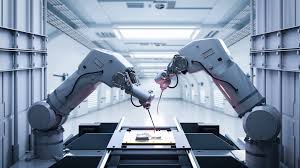Top 10 Companies Operating in The Global Hospital Logistics Robot Industry

Strong 8k brings an ultra-HD IPTV experience to your living room and your pocket.
Introduction:
The global healthcare industry is undergoing significant changes as technological innovations continue to shape the way medical services are delivered. One of the most exciting developments is the use of hospital logistics robots, which have the potential to revolutionize hospital operations and improve patient care. These robots are being deployed for a wide range of tasks, from delivering medications and medical supplies to transporting linens and waste, all of which help reduce human error, increase efficiency, and free up staff to focus on more critical aspects of patient care.
As the Hospital Logistics Robot market grows, many companies are leading the charge in designing and implementing these technologies. In this article, we will explore the top 10 companies operating in the global hospital logistics robot industry and discuss how their innovations are improving patient care and enhancing hospital operations.
1. Aethon
Aethon is one of the leading companies in the hospital logistics robot industry, known for its TUG robot. TUG is an autonomous mobile robot designed to transport medications, linens, meals, and other hospital supplies. It has been deployed in over 1,000 healthcare facilities across North America, Europe, and Asia. Aethon’s robots are integrated with hospital management systems to ensure smooth operations and real-time tracking of deliveries. By automating routine tasks, Aethon’s robots reduce human labor, enhance efficiency, and contribute to the overall improvement of patient care by allowing staff to focus on more critical activities.
Aethon’s robots also help eliminate the risk of human error, ensuring that supplies are delivered to the right locations at the right times. With Aethon’s systems in place, hospitals are able to provide more timely and accurate care to patients, ultimately improving outcomes.
2. Swisslog Healthcare
Swisslog Healthcare is another key player in the hospital logistics robot market, offering a range of automated solutions for hospitals. Their robots are used to transport medications, laboratory samples, sterile supplies, and more. Swisslog’s products, such as the RoboCourier, are designed to operate in busy hospital environments with minimal human intervention. These robots help reduce the time and effort spent on manual tasks, allowing healthcare professionals to allocate their time and resources more efficiently.
The impact of Swisslog’s robots on patient care is profound. By automating supply chain processes, Swisslog helps to ensure that medications and supplies are delivered quickly and accurately, preventing delays in treatment. This contributes to improved patient satisfaction and better clinical outcomes.
3. TUG Technologies (Aethon)
TUG Technologies, a division of Aethon, specializes in creating autonomous robots for hospital logistics. Their robots are designed to handle tasks such as transporting medical supplies, medications, linens, and patient records. By automating these functions, TUG Technologies reduces the need for hospital staff to perform time-consuming tasks and helps improve hospital workflows.
The use of TUG robots in healthcare settings allows for faster, more accurate delivery of supplies, ensuring that patients receive timely care. The robots are also designed to navigate hospital environments autonomously, ensuring safe transportation through crowded corridors and busy areas. This ultimately enhances the quality of patient care by reducing delays and improving the overall efficiency of hospital operations.
4. OTTO Motors
OTTO Motors is a prominent company in the field of autonomous mobile robots (AMRs) that are used in healthcare environments. OTTO Motors specializes in developing robots for material handling, waste management, and supply chain logistics within hospitals. Their robots are designed to work seamlessly with hospital staff, enabling the efficient transportation of materials such as medical supplies, equipment, and waste.
The primary impact of OTTO Motors' robots on patient care is their ability to free up healthcare workers to focus on tasks that directly affect patient health. By automating material handling, OTTO Motors improves workflow efficiency and ensures that hospital staff can respond to patient needs more quickly. Additionally, their robots help reduce the potential for contamination and improve hygiene by safely transporting waste and medical supplies.
5. GreyOrange
GreyOrange is an innovative robotics company known for its AI-powered logistics robots. In healthcare, GreyOrange’s robots are used for tasks such as transporting medications, medical supplies, and clean linens. Their robots are equipped with advanced artificial intelligence and machine learning capabilities, which allow them to optimize their routes in real time, avoid obstacles, and operate autonomously in busy hospital environments.
The ability to automate these processes ensures that hospital resources are delivered in a timely manner, which is crucial for patient care. GreyOrange’s robots also reduce the chance of human error, ensuring that supplies are delivered accurately, which can ultimately lead to faster and more efficient treatments. Additionally, the use of robots for logistics helps improve patient safety by reducing the likelihood of cross-contamination and ensuring proper handling of sensitive materials.
6. Starship Technologies
Starship Technologies is well-known for its autonomous robots used in urban delivery, and it has recently expanded its operations into healthcare logistics. Their robots, designed to transport food, medical supplies, and other essentials within healthcare facilities, are transforming hospital operations. The robots can navigate busy hospital corridors and deliver items safely and quickly, improving the speed and efficiency of hospital logistics.
By handling deliveries autonomously, Starship Technologies' robots help to free up staff time, allowing healthcare professionals to focus more on patient care. The increased efficiency not only improves hospital workflows but also directly impacts patient care by ensuring that supplies and medications are delivered on time. In hospitals where speed is critical, such as emergency departments or intensive care units, the use of these robots can reduce delays and improve patient outcomes.
7. Robosoft Systems
Robosoft Systems has developed a wide range of robots designed for use in hospitals, including logistics robots that can autonomously transport medical supplies and documents. Their robots are equipped with advanced navigation systems, making them suitable for use in complex hospital environments with crowded corridors and tight spaces.
The use of Robosoft’s robots in hospitals helps reduce the burden on hospital staff by automating material handling tasks. This not only improves operational efficiency but also ensures that supplies are delivered in a timely manner, which is essential for providing high-quality patient care. By eliminating the need for manual transport, Robosoft’s robots help hospitals reduce human error and ensure that patient care is more accurate and efficient.
8. Locus Robotics
Locus Robotics is another leading company in the robotics industry, known for its AI-powered robots used in logistics. Locus Robotics has recently made strides in healthcare, providing robots designed to optimize supply chain and logistics operations within hospitals. Their robots are used to transport medical supplies, pharmaceuticals, and other essential items throughout hospital facilities.
The use of Locus Robotics’ robots has a direct impact on patient care by improving the accuracy and timeliness of supply deliveries. Hospital staff are able to focus on patient care rather than spending time manually transporting items. By streamlining logistics, Locus Robotics helps hospitals ensure that patients receive the care they need when they need it, improving clinical outcomes and patient satisfaction.
9. Pudu Robotics
Pudu Robotics specializes in autonomous robots designed for material transport in various industries, including healthcare. Their robots are used in hospitals to deliver medications, food, and clean linens. Pudu Robotics’ robots are equipped with advanced navigation systems that enable them to work in complex hospital environments, ensuring that deliveries are made safely and efficiently.
By automating the transport of materials, Pudu Robotics’ robots help hospitals reduce the workload of staff, allowing them to spend more time directly caring for patients. Their robots also help improve hygiene by ensuring that materials are transported without human contact, which reduces the risk of cross-contamination. The overall impact on patient care is significant, as these robots improve hospital efficiency and contribute to faster, more accurate treatment.
10. KUKA Robotics
KUKA Robotics is a global leader in industrial automation, and its robotics technology has been successfully adapted for healthcare applications. KUKA’s robots are used for material handling, supply chain logistics, and waste management in hospitals. Their robots are designed to operate autonomously, allowing them to transport medical supplies, equipment, and waste with minimal human intervention.
The use of KUKA robots in hospitals leads to significant improvements in patient care. By automating supply deliveries, KUKA’s robots help reduce delays in treatment and improve workflow efficiency. This ensures that hospitals are better equipped to handle the needs of their patients in a timely and efficient manner, leading to improved patient outcomes and satisfaction.
Conclusion
Hospital logistics robots are having a profound impact on the healthcare industry, driving significant improvements in hospital operations and patient care. The top 10 companies leading this industry—Aethon, Swisslog Healthcare, TUG Technologies, OTTO Motors, GreyOrange, Starship Technologies, Robosoft Systems, Locus Robotics, Pudu Robotics, and KUKA Robotics—are transforming the way hospitals handle logistics, from medication delivery to waste management.
By automating routine tasks, these companies are helping hospitals reduce human error, improve efficiency, and free up healthcare workers to focus more on direct patient care. As a result, hospitals are able to provide faster, more accurate care, which directly contributes to better patient outcomes. The future of hospital logistics robots is bright, and as technology continues to advance, these robots will play an even more vital role in ensuring that patients receive the best possible care in a timely and efficient manner.
Read the complete blog
Note: IndiBlogHub features both user-submitted and editorial content. We do not verify third-party contributions. Read our Disclaimer and Privacy Policyfor details.







